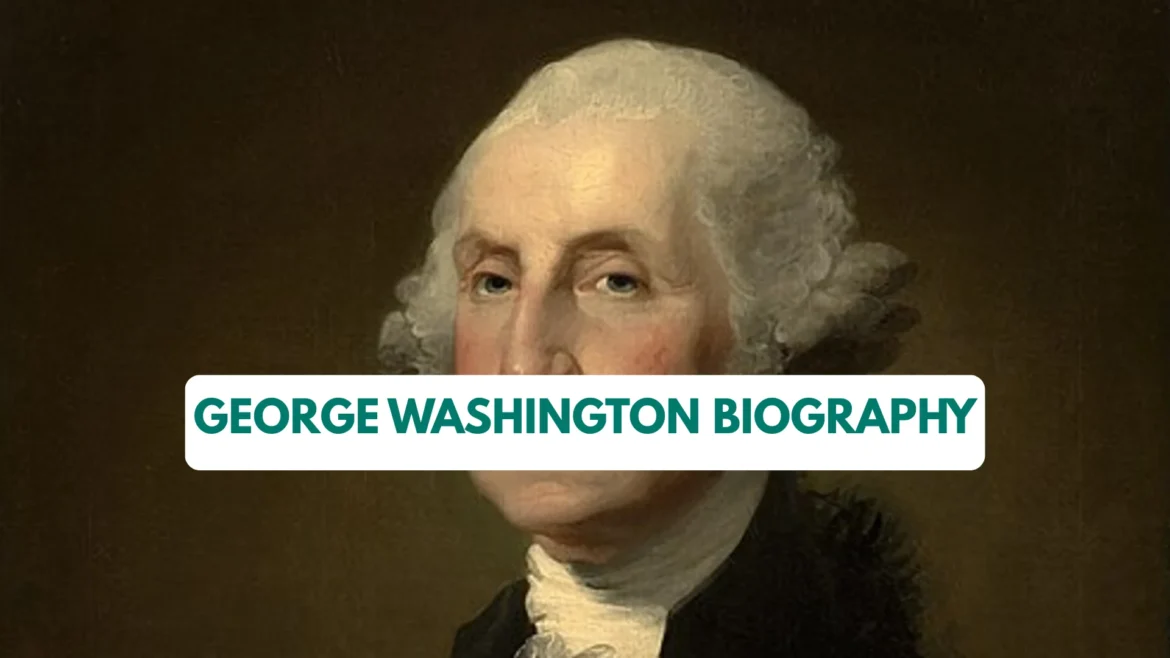George Washington stands among the most iconic figures in American history. As commander-in-chief of the Continental Army during the Revolutionary War and the first President of the United States, his leadership, integrity, and willingness to relinquish power shaped the early republic.
This biography explores Washington’s life from his Virginia boyhood through his military triumphs, presidential leadership, private life at Mount Vernon, and the enduring legacy that has made his name synonymous with the American experiment.
Bio Data
- Full Name: George Washington
- Born: February 22, 1732
- Age: Deceased
- Death: December 14, 1799
- Birthplace: Westmoreland County, Virginia, British America
- Nationality: American
- Occupation: Military Commander, Statesman, 1st President of the United States
- Height: Approximately 6 ft 2 in (188 cm)
- Religion: Anglican / Episcopalian
- Parents: Augustine Washington (father), Mary Ball Washington (mother)
- Siblings: Lawrence Washington, Augustine Washington Jr., Samuel Washington, John Augustine Washington, Charles Washington, and others
- Spouse: Martha Dandridge Custis Washington
- Children: No biological children (but step-children: John Parke Custis & Martha Parke Custis)
- Relationship: Married
Early Life and Background
George Washington was born into the planter class of colonial Virginia. Raised in the Tidewater region, he experienced the rural life of tobacco plantations and the responsibilities that came with managing land and enslaved labor. His formal education was modest by modern standards: he learned surveying and practical mathematics—skills that would prove useful in his early career. As a young man he worked as a surveyor, which allowed him to travel, build connections, and learn the geography of Virginia and the Ohio Valley—areas that would later become strategic in his military and political life.
Family and upbringing instilled in Washington the values of duty, propriety, and honor. Early military experiences—first as a young officer in the Virginia militia during the French and Indian War—introduced him to leadership under pressure and the complexities of colonial relations with Native nations, the British Crown, and fellow colonists.
Military Career and the Revolutionary War
Washington’s military reputation grew dramatically during the American Revolution. Appointed commander-in-chief of the Continental Army by the Second Continental Congress, he faced monumental challenges: a ragged army, shortages of supplies, and internal political discord. Yet through resilience, strategic patience, and an ability to inspire loyalty, Washington held the revolutionary cause together.
Key moments include the crossing of the Delaware River and the victories at Trenton and Princeton in 1776–1777, which reinvigorated American morale at a critical moment. Washington’s long winter encampment at Valley Forge demonstrated his capacity to endure hardship alongside his troops and to insist on discipline and training that later transformed the Continental Army into an effective fighting force. His diplomacy with foreign allies—most importantly the alliance with France—helped secure the resources and naval support necessary for final victory. The surrender of British General Cornwallis at Yorktown in October 1781 marked the effective end of major hostilities.
Washington’s military leadership combined prudence and courage; he often avoided reckless battle when the odds were poor, but he seized bold opportunities when they would yield strategic advantage. His ability to maintain unity among diverse colonial interests remains one of his most significant achievements.
Political Leadership and the Presidency
After the war, Washington confronted the challenge of transitioning from military leader to civilian statesman. He presided over the Constitutional Convention in 1787, where delegates drafted the U.S. Constitution. Although not a prolific speechmaker at the convention, Washington’s commanding presence lent credibility to the effort to create a stronger federal government.
Elected unanimously as the first President of the United States in 1789, Washington set many precedents for the new office: forming his cabinet, establishing a neutral foreign policy stance, and stressing the importance of a balanced government free from factionalism. His two terms (1789–1797) saw the establishment of key institutions—territorial policies, the judiciary, and a financial system under Alexander Hamilton’s guidance—that stabilized the economy and laid groundwork for national growth.
Washington’s Farewell Address in 1796 remains a classic statement of civic virtue. In it he warned against excessive partisanship, permanent foreign entanglements, and geographic factionalism—advice that would echo through American political discourse for generations. Crucially, Washington voluntarily stepped down after two terms, cementing a precedent for peaceful transitions of power that defined American democracy.
Personal Life and Mount Vernon
Away from public life, Washington was a devoted steward of Mount Vernon, his plantation on the banks of the Potomac River. Married to Martha Custis, a wealthy widow, Washington managed a large estate and household. He was also an owner of enslaved people—this fact complicates his legacy and invites necessary, honest reflection. In later years he wrestled privately with the institution of slavery; in his will he freed the enslaved people he directly owned (a rare act among the founding generation), though he did not use his presidency to abolish slavery.
Washington’s personal habits—an emphasis on civic duty, frugal living, and punctuality—were widely admired. He was a farmer, innovator in agricultural practices of his time, and keenly interested in the management of his lands and labor. Despite the constraints and contradictions of his era, he sought to be remembered as a man of principle.
Leadership Style and Character
Washington’s leadership combined moral authority with practical skill. He rarely sought glory for himself, preferring to act for the public good. His humility, resilience, and adherence to principle created widespread trust. He was not a charismatic orator in the classic sense; his strength lay in reliability, restraint, and the symbolic power of his personal example. These traits made him uniquely suited to lead a fragile new nation.
Death and Legacy
George Washington died in December 1799 at Mount Vernon. From the earliest moments after his death, American memory elevated him as a model of republican virtue—the “Father of His Country.” Monuments, the naming of the capital city (Washington, D.C.), and countless memorials attest to his central place in national identity.
Washington’s legacy is complicated. He is remembered as a nation-builder who provided stability and practical governance at the republic’s vulnerable start—but also as a man shaped by, and complicit in, an economy dependent on slavery. Modern historical analysis seeks to hold both truths together: honoring his role while critically examining the structures he did not dismantle.
Impact on American Institutions
Washington’s precedents helped define executive power and civic norms. By establishing the cabinet, enforcing federal law (in limited circumstances), and refusing to become a monarch-like figure, he anchored republican governance. His decisions on neutrality in foreign affairs and on the use of federal power helped shape early American foreign policy and constitutional practice.
Conclusion
George Washington’s life is a narrative of responsibility and contradiction: a leader who refused unilateral power, who led an army to independence, and who created the patterns of presidential practice that remain foundational today. Understanding Washington means recognizing both his extraordinary civic contributions and the moral limits of his time. His example invites ongoing discussion about leadership, patriotism, and the unfinished work of American democracy.
Frequently Asked Questions (FAQs)
When and where was George Washington born?
George Washington was born in Westmoreland County, Virginia, in the colonial era.
Was Washington a general during the Revolutionary War?
Yes. He served as commander-in-chief of the Continental Army from 1775 to 1783 and led American forces to victory.
How many terms did Washington serve as president?
Washington served two terms, from 1789 to 1797, and then declined to run for a third term.
Did Washington own enslaved people?
Yes. Washington owned enslaved people during most of his life; in his will he made provisions to free those he directly owned after his wife’s death.
Why is Washington called the “Father of His Country”?
The title reflects his central role in the founding of the United States—military leadership, presiding over the Constitutional Convention, and setting precedents as the first president.
What is Washington’s most famous speech?
The Farewell Address (1796) is among his most lasting, offering warnings about political parties and foreign entanglements.




